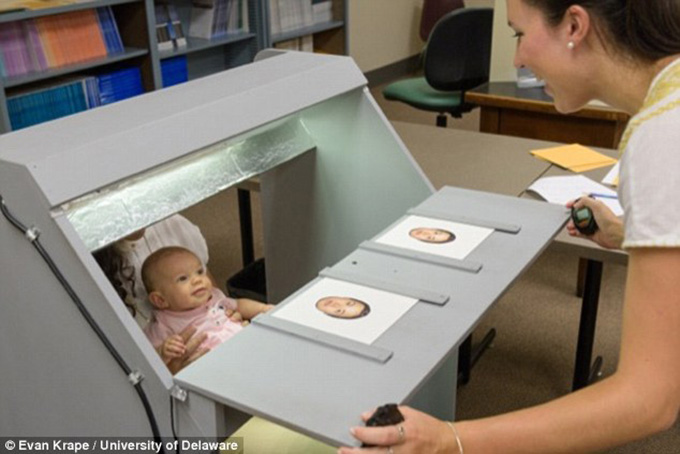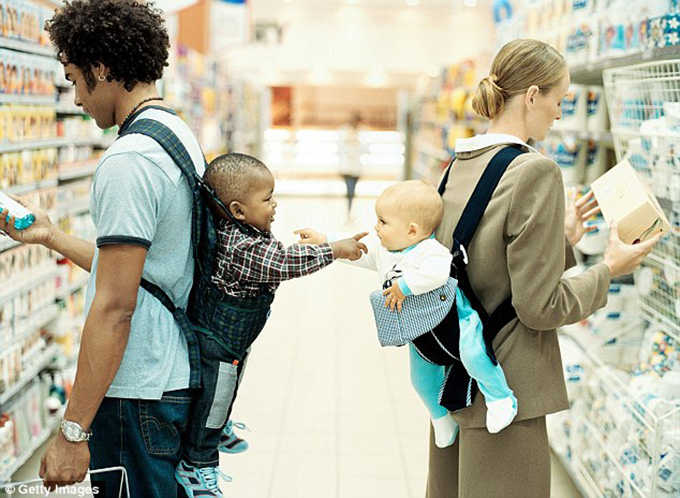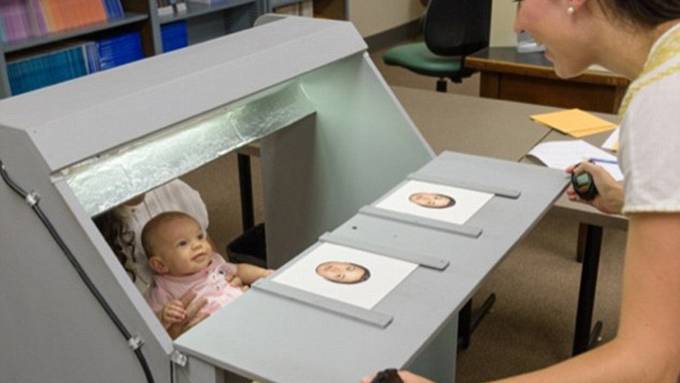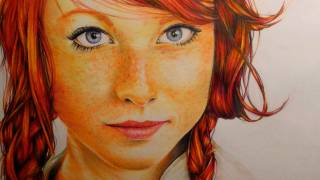Is your baby racist? Scientists discover a way to reverse racial bias in young children
Source: dailymail.co.uk
Editor's note: Finally the bias of an innocent child can be erased in the name of "anti-racism," peace and rainbows. They are destorying human nature!...
Children as young as three months old have been found to have a bias towards women who are the same race as themselves.
Now, a University of Delaware scientist has discovered a simple exercise that he claims can undo this unconscious racial biases in young children.
Using the technique of measuring how much time the babies spend looking at pictures of faces, Paul Quinn has spent a decade studying how infants classify race and gender.

Children as young as three months-old have been found to have a bias towards women who are the same race as themselves. Now, new research by a University of Delaware scientist has found a simple exercise that can undo the unconscious racial biases in young children
At six months, Quinn said, the infants were classifying faces into three groups - Caucasian, African and Asian.
He has found that, by nine months of age, infants not only distinguish racial categories but also become less able to tell different individuals apart if they are members of a less-familiar race.
For example, white infants can identify white faces as belonging to different individuals, but they are less likely to see Asian or African faces as distinct individuals.
'Might these perceptual biases we see in infants be related to the social biases that we see in older kids, beginning at three or four years of age, and adults?,' Quinn said.
'And if they are, can we use a technique to reduce bias?
'As we tried to answer this question, we hit on the idea that if the perceptual and social biases are linked, we might be able to reduce the social bias by perceptual means.'

At six months, Quinn said, the infants were classifying faces into three groups - Caucasian, African and Asian. He has found that, by nine months of age, infants not only distinguish racial categories but also become less able to tell different individuals apart if they are members of a less-familiar race
In their latest study, published in July in the journal Developmental Science, Quinn and his collaborators in China used photos of African and Asian faces and morphed them together to create ambiguous images that looked equally African and Asian.
Some of the faces had pleasant expressions, while others looked more severe.
When researchers showed the images to four- to six-year-olds in China, the children identified the happy faces as Asian - the category they were used to seeing - and the angry faces as African, a group they rarely saw in daily life.
The scientists' wanted to see whether the children's unconscious racial biases could be disrupted.
They showed the youngsters five different African faces and gave each of the individuals a name, repeating the process until the children could identify each of the five faces by name.
Babies 15 Months-old Show Racial Bias When Picking Playmates
Toddlers show racial bias when picking playmates, a study last year revealed. They also take account of how fairly others behave.
Researchers tested the reaction of white 15-month-olds as toys were distributed.
Two white adults divided the toys, one equally and the other unequally.
Seventy per cent of the toddlers chose to play with the researcher who distributed the toys fairly.
But in a second test, when one researcher favoured a white recipient over an Asian one, they picked the 'fair' researcher less often, the journal Frontiers in Psychology reports.
And the babies are more likely to help those who share the same ethnicity, which is known as in-group bias when people favour those with the same characteristics as oneself.
The University of Washington team first noticed the phenomenon when the infants began playing favourites with the researchers during a previous experiment.
Professor Jessica Sommerville said: 'At the time, about half of the research assistants in my lab were Asian-American and the other half were Caucasian, and most of the babies in our experiments are Caucasian.
'We know that by preschool, children show in-group bias concerning race, but results in infants have been mixed.
'It's surprising to see these pro-social traits of valuing fairness so early on, but at the same time, we're also seeing that babies have self-motivated concerns too.'
When the children then looked at the happy and angry ambiguous-race photos again, their bias in favour of their own racial group had dropped dramatically.
'This process of getting the kids to respond to the [five African] faces as individuals, not as a category, only takes 15-30 minutes, and it made a significant difference,' Quinn said.
'It suggests that what is a social bias has [visual] perceptual components and that it can be disrupted.'
Another, related study that Quinn conducted in his lab at UD with babies from the Newark, Delaware, area has been published online by Developmental Science, with print publication expected in the future.
In this study, researchers worked with Caucasian babies to explore how and at what ages they began forming categories of people based on the racial characteristics of faces.
Source: dailymail.co.uk






















